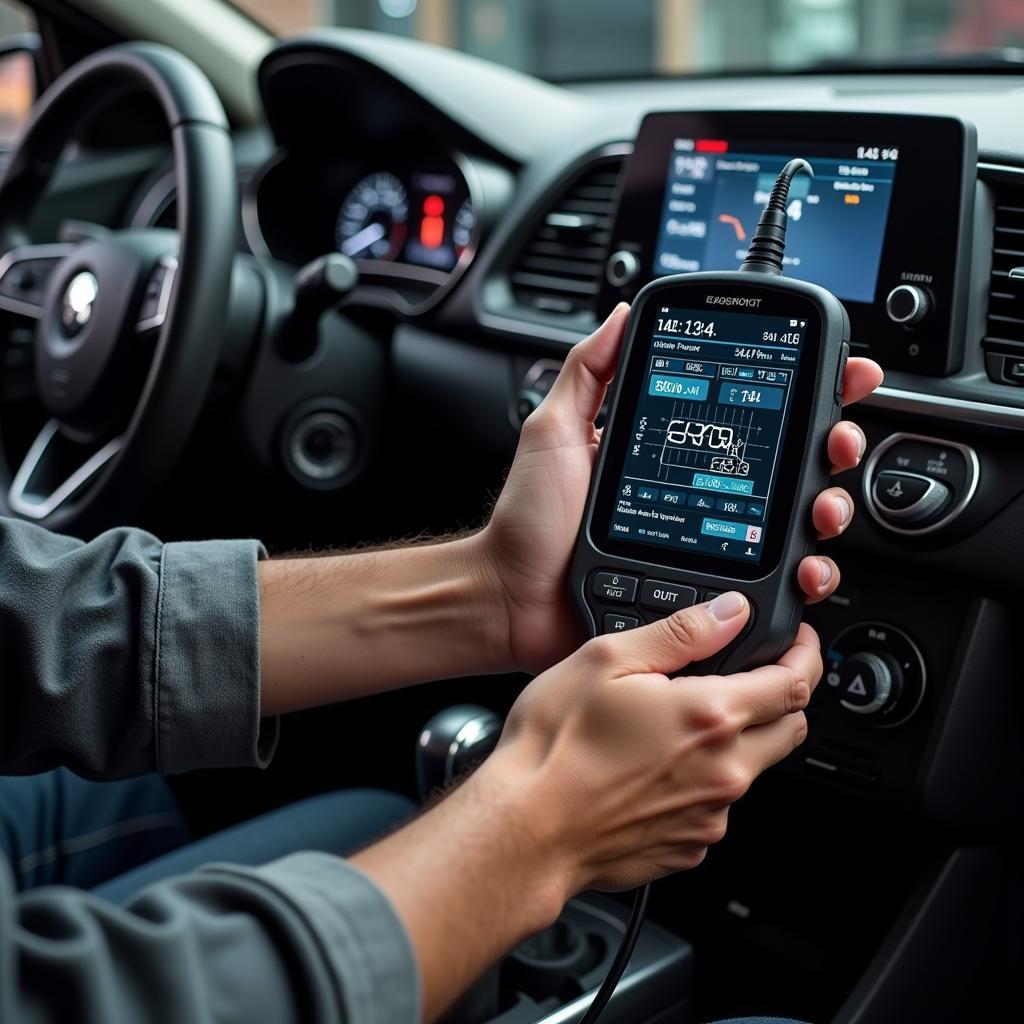Car diagnostic test tools are essential for anyone who owns, maintains, or repairs vehicles. These tools, ranging from simple code readers to advanced diagnostic scanners, empower users to identify and troubleshoot issues efficiently, saving both time and money. This guide explores the world of car diagnostic test tools, covering everything from basic functionalities to the latest advancements in automotive diagnostics.
Understanding the Importance of Car Diagnostic Test Tools
In today’s increasingly complex vehicles, a simple visual inspection often isn’t enough to pinpoint the root cause of a problem. Car diagnostic test tools bridge this gap by providing access to the vehicle’s onboard computer, retrieving diagnostic trouble codes (DTCs), and offering valuable insights into the various systems’ performance. These tools have revolutionized the automotive industry, enabling quicker diagnoses and more effective repairs. Having access to the right car diagnostic test tools is like having a direct line to your car’s brain, understanding its language, and deciphering its secrets.
 Car Diagnostic Tools in Action
Car Diagnostic Tools in Action
Types of Car Diagnostic Test Tools
Car diagnostic test tools come in various shapes and sizes, each designed for specific tasks and user expertise levels. Understanding the different types can help you choose the tool that best suits your needs:
- Code Readers: Entry-level tools that retrieve and display DTCs. Ideal for DIY enthusiasts and basic troubleshooting.
- OBD-II Scanners: More advanced than code readers, offering access to live data streams and additional functionalities like freeze frame data.
- Professional Diagnostic Scanners: Comprehensive tools used by professional mechanics and technicians, providing in-depth diagnostics, bi-directional controls, and advanced programming capabilities. These tools often come with manufacturer-specific software for more detailed diagnostics.
- Specialized Diagnostic Tools: Designed for specific vehicle systems, such as transmission analyzers, oscilloscope, and battery testers.
Choosing the Right Car Diagnostic Test Tool
Choosing the right car diagnostic test tool can seem daunting with the wide range of options available. Consider the following factors when making your decision:
- Vehicle Compatibility: Ensure the tool is compatible with your vehicle’s make, model, and year, particularly its OBD-II protocols. korean latest car diagnostic tools are a good example if you own a Korean car.
- Features and Functionality: Determine the features you need, such as code reading, live data streaming, bi-directional controls, and special functions.
- User Interface: Choose a tool with an intuitive and easy-to-use interface. A clear display and user-friendly software are crucial for efficient diagnostics.
- Budget: Car diagnostic test tools range in price from affordable code readers to expensive professional-grade scanners. Set a budget and find the best tool within your price range.
What are the benefits of using car diagnostic test tools?
Car diagnostic test tools offer numerous benefits, including:
- Faster Diagnosis: Quickly identify the source of vehicle problems.
- Cost Savings: Avoid unnecessary repairs and costly guesswork.
- Improved Maintenance: Monitor vehicle health and perform preventative maintenance.
- Enhanced DIY Capabilities: Empower car owners to troubleshoot and fix minor issues themselves.
“A reliable car diagnostic test tool is an investment that pays for itself over time,” says Michael Davis, Senior Automotive Technician at Ace Auto Repair. “It eliminates the guesswork, speeds up repairs, and ultimately saves our customers money.”
Future Trends in Car Diagnostic Test Tools
The field of car diagnostics is constantly evolving. new diagmostic car tool and technologies are emerging, pushing the boundaries of automotive diagnostics. Some key trends include:
- Wireless Connectivity: Increasing use of Bluetooth and Wi-Fi for data transfer and remote diagnostics.
- Cloud-Based Diagnostics: Storing and accessing diagnostic data on cloud platforms for improved data management and collaboration.
- Artificial Intelligence: Utilizing AI and machine learning for predictive maintenance and automated diagnostics. hybrid cars tools testers are becoming increasingly sophisticated with the integration of AI.
- Augmented Reality: Overlaying diagnostic information onto real-world images for a more intuitive and immersive diagnostic experience.
“The future of car diagnostics lies in the seamless integration of data, software, and hardware,” says Dr. Emily Carter, Automotive Research Scientist. “We’re moving towards a world where vehicles can self-diagnose and communicate their needs proactively.”
Conclusion
Car diagnostic test tools are indispensable for anyone involved in the automotive world. From simple code readers to advanced diagnostic scanners, these tools provide a powerful way to understand and maintain vehicles. Choosing the right car diagnostic test tool can empower you to quickly diagnose problems, save money on repairs, and enhance your overall automotive experience. Don’t get left behind – embrace the power of car diagnostic test tools and keep your vehicles running smoothly. Remember to consider latest car diagnostic tools 2018 as a benchmark when evaluating newer models.
FAQ
- What is an OBD-II port?
- How do I use a car diagnostic test tool?
- What are diagnostic trouble codes (DTCs)?
- Can I use a car diagnostic test tool on any vehicle?
- What are the common problems diagnosed with these tools?
- How much do car diagnostic test tools cost?
- Where can I buy car diagnostic test tools?
For assistance contact us via WhatsApp: +1(641)206-8880, Email: [email protected] or visit us at 910 Cedar Lane, Chicago, IL 60605, USA. Our customer service team is available 24/7.

